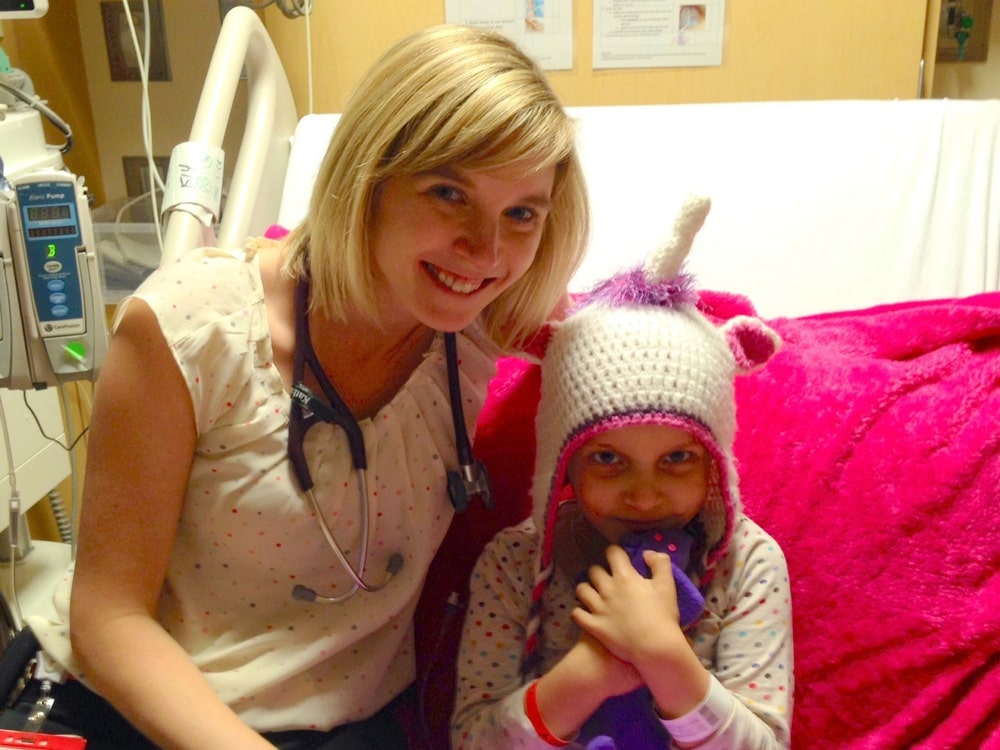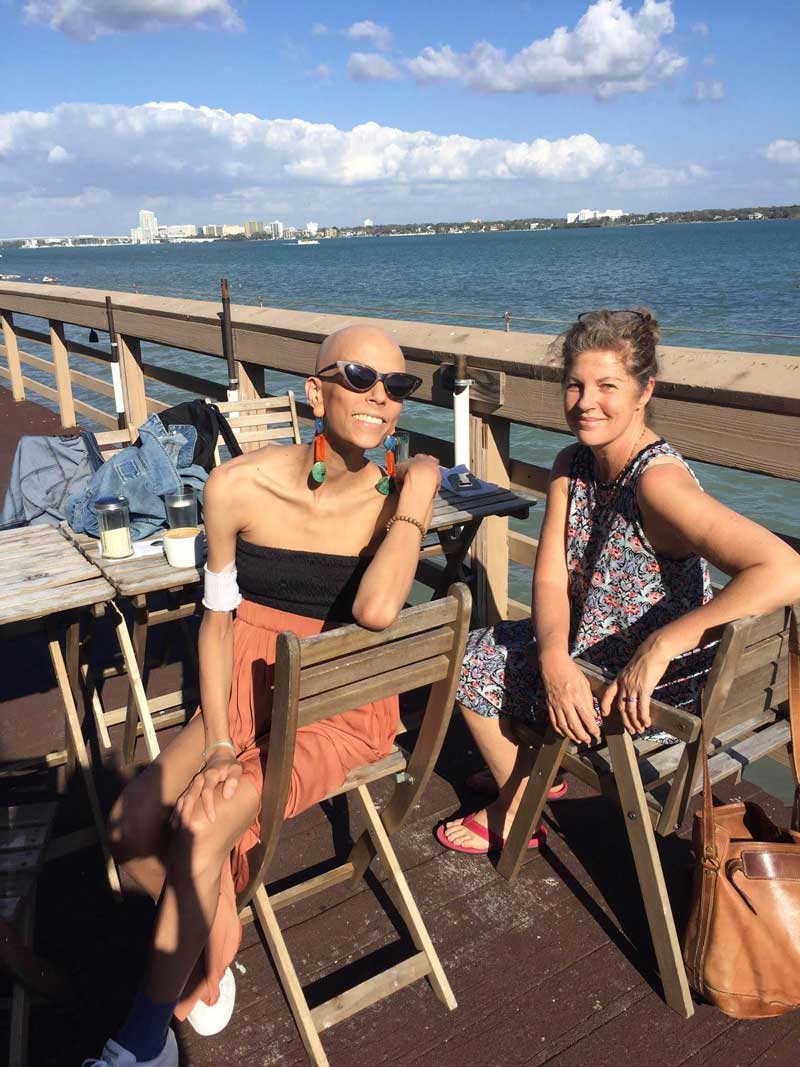The Truth About Palliative Care—It’s Better Than You Might Think

Rally kid Sophia parasailing
For many pediatric cancer patients and their families, palliative care is a beacon of comfort during the extreme discomfort of symptoms, side effects and the stress that goes along with their diagnosis. Because of this, we wanted to showcase the importance of pediatric palliative care and how it can make a difference in the lives of children fighting cancer.
Last year, we talked to pediatric hematologist-oncologist Katharine Brock, MD, MS, who specializes in palliative medicine at Children’s Healthcare of Atlanta (CHOA). As one of 43 doctors specializing in pediatric hematology-oncology at CHOA, Dr. Brock has made it her mission to improve the care experience for both patients and their families.

Dr. Katharine Brock with her patient Maddie
One of our Rally Kids and her mom, Cheryl, found Dr. Brock particularly comforting during their time in palliative care.
“Dr. Brock was extremely helpful in managing my pain. I was in so much pain all of the time, and she helped me feel comfortable and get the rest I needed to continue facing treatment. I often have trouble asking people for help, and she made it clear to me that I did not have to be afraid to ask for help when it came to managing my pain.” – Rally Kid Peyton, now a freshman at the University of Chapel Hill North Carolina
“We loved Dr. Brock from the start! Her expertise on palliative care really came into play once Peyton had been released from the hospital after her first transplant. Like most BMT (Bone Marrow Transplant) patients, Peyton was struggling with the painful symptoms and side effects that were occurring due to the new cells in her body grafting in. And like most cancer kids, she was taking endless amounts of medications. Dr. Brock would meet with me and Peyton in outpatient clinic and really take the time to listen to Peyton and ask her so many great questions about her pain and her symptoms. She normalized what Peyton was feeling and helped determine a medication plan that would allow Peyton to be more comfortable and hopefully function better. These meetings seemed to always make Peyton feel less stressed about what was going on with her body.” – Rally Kid Peyton’s mom, Cheryl

Rally Kid Peyton and her friends enjoying their freshman year at UNC
As you can see, the impact of palliative care is immeasurable, and Dr. Brock’s dedication and passion are evident in these interactions with patients and their families. That’s why, this year, we wanted to shine a light on Dr. Brock’s work and accomplishments, her dedication to researching and improving supportive care and specifically how, with funding from Rally, she’s shaping the lives of kids and their parents through her work at the Supportive Care Clinic at the Aflac Cancer and Blood Disorders Center.
A Brief Background on Palliative Care
Defined simply, palliative care is specialized medical care for people living with serious illnesses. It focuses on providing relief from the symptoms, side effects and stress of a serious illness, like cancer. The goal is to improve quality of life for both the patient and the family—and that is a very good thing.
Palliative care is provided by an expert team of palliative care doctors, nurses and social workers who work together with a patient’s primary doctors and family support team to provide an extra layer of support. It is appropriate at any age and at any stage in a serious illness and can be provided along with curative treatment.
Many people think that palliative care or supportive care is one step from hospice, which isn’t necessarily true. Palliative and supportive care improves quality of life for all patients and families at all stages of disease: those seeking curative treatment as well as those whose children are moving toward hospice or end-of-life. But it is important for people to understand that palliative care is for any family seeking an added layer of support, better communication, a treatment plan that matches their hopes and values or improved symptom control for their child.
Palliative and supportive care aligns strongly with Rally’s mission to find better treatments.
Dr. Brock first became interested in palliative care when she was a college student working at Gundersen Lutheran Hospital in Wisconsin back in 2004. She was asked to develop a coping program for children who had a parent with cancer, and then a bereavement program for the pediatric oncology program. Listening to many bereaved parents sparked her interest in whole-person and family-centered care that extended beyond the time of therapy. “I was drawn to the intensity of the journey and wondered how we could help patients and families get through this experience while living as well as possible,” she explained.
To learn more about palliative care and Dr. Brock’s personal journey, read our blog post from last year: World Hospice and Palliative Care Day: How Dr. Katharine Brock Provides Comfort & Care
Why Funding is Important for Palliative and Supportive Care
Funding for palliative care, like all forms of treatment for childhood cancer, is incredibly important. At Rally, we believe strongly in the power of palliative and supportive care. In fact, we were the first organization to fund Dr. Brock’s work at CHOA.
For Dr. Brock, that funding has been instrumental in the development of pediatric palliative oncology at CHOA. Rally’s support led to the opening of the Supportive Care Clinic in 2017, and the ability to track outcomes of patients and the providers that refer their services.
“We showed that for high-risk cancer patients, our one-day a week clinic was able to increase the amount of people receiving specialized palliative care by 25 percent and meet patients two months earlier in the journey. For patients who died from their cancer, having access to a Supportive Care Clinic increased the time that patients spent out of the hospital in the last months of life,” shared Dr. Brock. “We were also able to publish U.S. outpatient pediatric palliative oncology models. Our plan is to continue to study the work of the Supportive Care Clinic, and the outcomes and quality of life of patients receiving palliative oncology services.”
In addition, the Supportive Care Clinic is thriving and has served over 145 patients across 500 visits since 2017. The program continues to grow and recently added a part-time nurse practitioner. “Our goal is also to expand with additional psychosocial support clinicians, psychology and integrative therapies, which includes services like massage, aromatherapy and acupressure,” said Dr. Brock.
Furthermore, three CHOA teams of MD/RNs, along with Dr. Brock, will be part of a funded National Institutes of Health (NIH) R01 study of six pediatric institutions (primary site: Indiana University) that incorporates early palliative care conversations into pediatric oncology with the goal of improving communication, quality of life and if needed, end-of-life care for children with poor prognoses. A R01 is a Research Project Grant (R01) awarded by the NIH. The R01 provides support for health-related research and development. It is one of the most difficult NIH awards to receive. Other study sites include MD Anderson, Seattle Children’s, Children’s Hospital of Wisconsin, St. Louis Children’s, and Children’s Hospital Colorado.
What Dr. Brock’s Patients are Saying
What palliative care really comes down to is the patient and their family. “Our role is to focus on a patient’s and family’s hopes and goals, make sure that our medical care honors these hopes and goals, improve quality of life through good symptom control and excellent communication and try to make each day as good as possible,” said Dr. Brock.
Within the last decade, the medical community has come to understand the importance of palliative care for patients with cancer—so much so that it is now recommended as the standard of care. Once families understand the role palliative care teams play and how they can help with so many aspects of their child’s care, the benefit speaks for itself.
Here are a few things Dr. Brock’s patients and their families had to say about the palliative care they received at CHOA:
“There is no value you can put on life. Nor is there a value you can put on someone who has your back when you realize you’re terminally ill. Dr. Brock chose to build a relationship with Sophia that encouraged her to go out and live life for her remaining days. She allowed Sophia the freedom to hypothetically jump from a plane without a parachute. Not only did she encourage Sophia to jump, she planned for Sophia’s fall, and did everything within her power to help her land safely. And Sophia lived her remaining life fully, safe in the knowledge that Dr. Brock would recover Sophia and get her stable again when needed. Dr. Brock’s efforts transcended standard professionalism in her ability to relate to Sophia, to educate her and to be trusted by her. Her knowledge and experience are expansive. Her attention to detail and her ability to apply these skills was highly effective in maintaining Sophia’s remaining quality of life.” – parent of Sophia

Rally Kid Sophia with her mom
“I really appreciate this visit. The oncology team cares about my quality of life, but in a what-chemo-plan-to-use sort of way. You care about my quality of life, but in a really different way. And I like the different ways of thinking.” – adolescent patient
“He was almost giddy when we left the appointment with you. He said he really loves you all so much and just felt good when he comes there.” – parent of a teen patient with a brain tumor
The Future of Palliative Care: What You Can Do to Help
The value of supportive care is immeasurable, yet in 2019, we are still unable to provide this support for every child fighting cancer due to costs and availability of services. In addition, toxic therapies are still in use that cause side effects, stress and suffering for all members of the family.
While we hope for cures, we also have to focus on holistic, person-centered treatment of our current patients. Each family is different, and we must make sure that families are receiving high-quality, honest communication that aligns with that family’s values, goals and hopes. We must develop new ways of partnering with pediatric oncology to provide palliative and supportive care so that we can continue to reduce suffering, improve care coordination and make each day as good as possible for patients and families.
When you make a donation to Rally, you’re helping fund treatments like palliative care and the life-changing benefits that go along with it. Join us in helping doctors like Dr. Brock find better treatments with fewer long-term side effects and eventually cures for childhood cancer.
